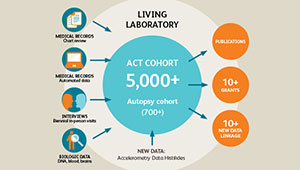TBI linked to Parkinson’s and Parkinson-related brain defects

Dr. Eric B. Larson relates research to Muhammad Ali—and how we can prevent late-life injuries and falls for our families and ourselves.
by Eric B. Larson, MD, MPH, executive director of Group Health Research Institute and vice president for research at Group Health
Traumatic brain injury (TBI), including concussion, is a big problem in older adulthood, the stage of life when accidents—especially falls—happen most often. Yet we hear a lot about TBI from sports, particularly football head injuries in younger people.
Muhammad Ali, who recently died, had a symptom complex called Parkinsonism. It’s very likely that multiple blows to the head from boxing set the stage for this condition. A new study that I helped to lead confirms concern over effects of TBI that threaten the structure and function of brain cells.
Here’s what we found—and didn’t find
With colleagues from the University of Washington (UW), Mt. Sinai School of Medicine, Cleveland Clinic, Rush University Medical Center, and the University of Utah, Paul Crane, MD, MPH, and I recently published “Association between Traumatic Brain Injury and Late Life Neurodegenerative Conditions and Neuropathological Findings" in JAMA Neurology. Dr. Crane is a professor of general internal medicine at the UW School of Medicine, an adjunct professor of health services at the UW School of Public Health, and an affiliate investigator at Group Health Research Institute (GHRI).
We found that when people have a history of a TBI with loss of consciousness, they are more likely to develop Parkinson’s disease, parkinsonian features, microscopic strokes (microinfarcts), and Lewy bodies. Lewy bodies are abnormal collections of protein inside brain cells, and they play a role in Parkinson's disease and Lewy body dementia. Our findings suggest that a TBI with loss of consciousness predisposes people to Parkinson’s-spectrum neurodegeneration.
By contrast, unlike some prior studies, we found that TBI with loss of consciousness was not associated with dementia, clinical Alzheimer’s disease, or brain findings of plaques or tangles seen in Alzheimer’s disease. We’re concerned about the effects of TBI that is repeated (as with Muhammad Ali) or happens later in life. But many of our study participants who were unconscious for longer than an hour were under 25 when the injury occurred.
These findings come from the joint Group Health-UW Adult Changes in Thought study, which Dr. Crane and I co-lead, and two other community-based studies. An important accomplishment, our latest research is by far the largest exploration of associations between TBI and neuropathology findings from autopsy. And it shows the power of ongoing community-based studies of aging and the brain. But there’s more.
How to prevent falls
On a practical level, though, this research should remind us of just how important it is to prevent falls and other accidents. Here’s how you can prevent falls:
- Get regular exercise for general conditioning, strength, and balance training.
- Avoid drugs that impair balance and judgment, such as narcotics, anticholinergics, and tranquilizers, and avoid overtreating high blood pressure and diabetes.
- Eliminate hazards in your environment—like inadequate lighting, rugs and cords that can cause tripping.
- Wear shoes or slippers with good soles that are not too thick. The ACT study has shown that older people are much more likely to fall in the home if they walk barefoot or in stocking feet.
- At some point, consider using a cane or walker to avoid falls.
We recently saw a couple who still live independently at ages 101 and 95. Both had made the wise choice of using a walker at all times. They knew that a fall could result not only in a TBI but even more likely in a hip or wrist fracture that would almost certainly threaten their ability to continue to live independently.
ACT Study

ACT study: Long-running study of aging examines changes in Group Health patients over time
Drs. Larson and Crane co-lead Group Health-University of Washington collaboration learning how to promote healthy aging.


